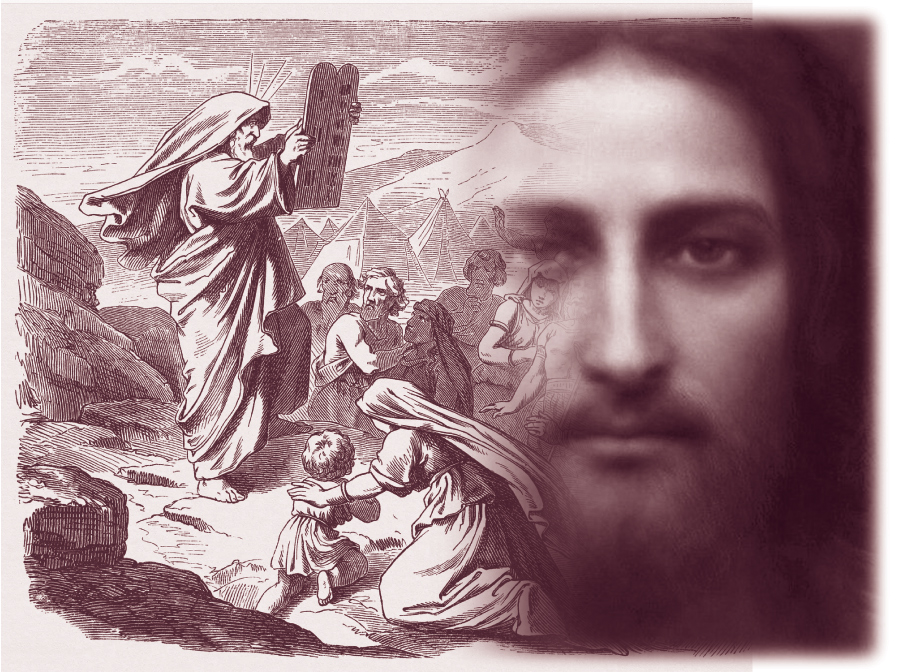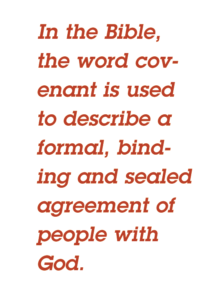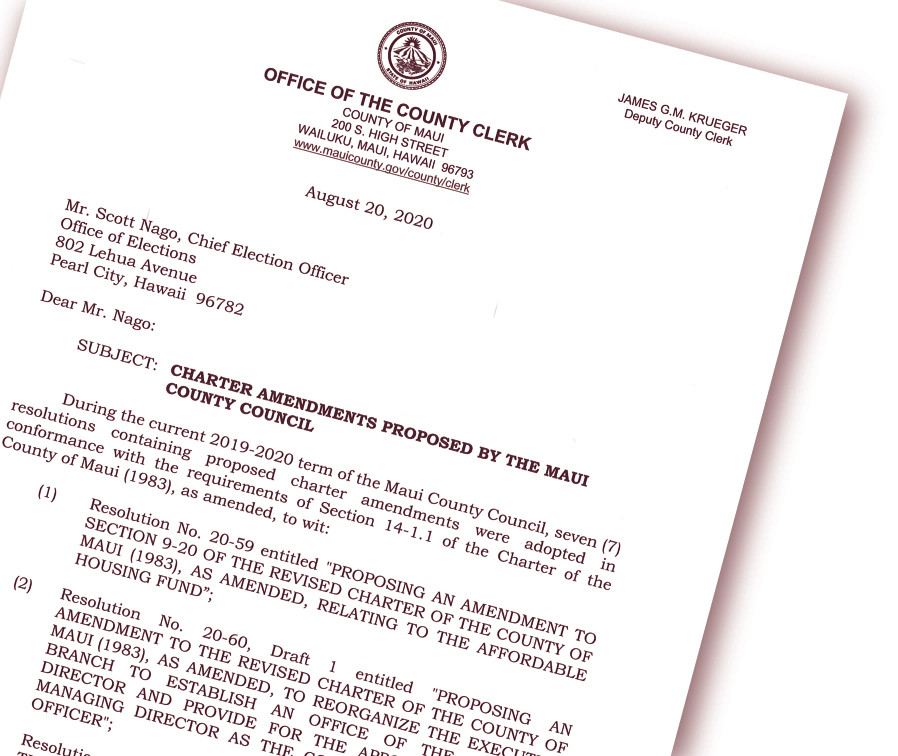Maui County Charter: Relevent To Our Everyday Lives
The County Charter is akin to God’s Covenant as it serves to affect our social civility, order, peace and happiness in Maui County.
John A.H. Tomoso†
There will be charter amendments on our ballots in November. Specifically, we will be asked to vote on changes to the Maui County Charter. This document is the formal statement of rights and responsibilities, as agreed upon by the citizens of the County of Maui. As a formal document of government and governance, it describes not only our rights and responsibilities but also our aims or principles as a people, living together, in civic and social relationships and community, on the islands of Maui, Molokai and Lanai.

The Maui County Charter describes in formal words, phrases and paragraphs, what we, as citizens, ask of our government, to whom we have deemed civic and governing authority. In turn, the Maui County Charter authorizes us, as citizens, to participate in the government, spelling out in sufficient detail what that participation entails, including rights and responsibilities. The Maui County Charter is an agreement under which all of us, as citizens, live, work, recreate and have more than a modicum of civility, order, peace and happiness. My understanding of government is that those who are governed must know to what extent that government benefits all who come within its jurisdiction; its reach; its boundaries. But the government has to continually be redefined, re-organized, so that the governed, i.e. the people, who necessarily change with the times, continue to understand it, recognize it, to know their rights and exercise their responsibilities.
 In the Bible, the word covenant is used to describe a formal, binding and sealed agreement of people with God. What does it mean that, for those who believe, there is a Covenant with God? What is the agreement all about and is there anything in life that is not covered? My understanding of this Covenant which is couched in my being faithful to and understanding of God, is such that it encompasses everything and everyone “as far as the eye can see!” I understand it to be important to how I live my faith, to how I relate that faith to others and how I journey in that faith to my ultimate and eternal destination.
In the Bible, the word covenant is used to describe a formal, binding and sealed agreement of people with God. What does it mean that, for those who believe, there is a Covenant with God? What is the agreement all about and is there anything in life that is not covered? My understanding of this Covenant which is couched in my being faithful to and understanding of God, is such that it encompasses everything and everyone “as far as the eye can see!” I understand it to be important to how I live my faith, to how I relate that faith to others and how I journey in that faith to my ultimate and eternal destination.
I can see a connection between a charter and a covenant. The charter amendments we will vote on in the general election help us to see our county (local) government as relevant to our day-to-day lives; even the minutiae of what government provides and doesn’t provide. These amendments will help our county (local) government to contribute to our quality of life, i.e. our civility, order, peace and happiness. The Maui County Charter allows us to have not only a quality of life but also quantity of life. It allows fairness and equity. All of these realities go hand-in-hand to make life on this island (in Maui County) not only worth living but worth nurturing and let’s face it, paying for.

You might ask, what does the Covenant with God nurture and pay for? Without sounding too philosophical or theological, the covenant allows higher and deeper meaning to be attributed to civility, order, peace and happiness. I’d like to take these one at a time.
• Civility: Let’s consider how we treat one another, not only as human beings, with respect and dignity but also as images and reflections of God. To be civil with one another is to understand that as all creation is holy, so is every person holy. I know my parents and elders always told me you must treat everything, everyone with respect and see the dignity of it all. I remember my Filipino grandpa telling me, “God is watching.”
• Order: There is a general understanding that without order, there is chaos. And if this chaos prevails, anarchy and lack of civil rights ensue. God is perfect and God made everything perfect. In nature, everything is perfect and human beings fit perfectly in all of nature. I am amazed at how the little things in life and nature, all around me, are perfectly ordered and sometimes, with only a little help from me, they grow into beautiful maturity. Sometimes we try to force an order into things and people. It usually doesn’t work. But I suppose that’s why we have laws and police!
• Peace: You’ve heard the saying “Life is too short for fighting.” Like love, peace is of God. If God is love, God is also peace. With peace, comes truth and understanding. I’ve learned true love and peace comes with humility, patience and kindness. A world, a society at peace, in one in which all will come to love and peace. What gets in the way is our own imperfect selfishness and arrogance and lust. How does the government deal with selfishness, arrogance and lust? Can we, as citizens, figure out how it does.
• Happiness: There is a country, Bhutan, that has formally declared that its “charter” its “Gross National Product” is Happiness. One can’t really buy happiness. One can be happy just like one can be sad. In government charters, is happiness defined and codified? Perhaps but in God’s Covenant, I believe happiness is the close up to God. It is right up there with love and peace. I know the day after the election, there will be those who are happy and those who are sad.
The Maui County Charter and God’s Covenant, put side-by-side; with each contributing to quality of life and to “peace of mind” (and body and spirit) that can thrive and be nurtured, in among all of us. The key to it all, civilly, is to VOTE. The key to it all, from God’s perspective, is to HAVE FAITH. Put side-by-side, voting and faith contribute to the rights and responsibilities, with fairness and equity, that we all enjoy here in the County of Maui.
 John A. Hau‘oli Tomoso† is a Priest in the Episcopal Diocese of Hawai‘i and a retired Social Worker, with 42 years of licensed practice. Born and raised on Maui, he lives in Kahului with his wife Susan D. Tomoso, who is a retired Educator with 30 years of teaching experience.
John A. Hau‘oli Tomoso† is a Priest in the Episcopal Diocese of Hawai‘i and a retired Social Worker, with 42 years of licensed practice. Born and raised on Maui, he lives in Kahului with his wife Susan D. Tomoso, who is a retired Educator with 30 years of teaching experience.
